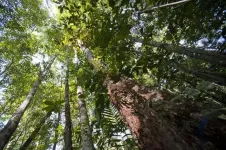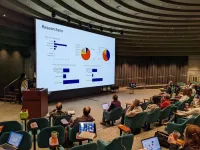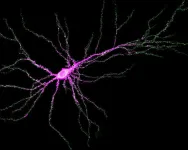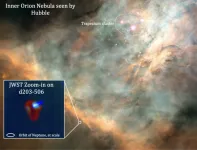(Press-News.org) In a landmark study, researchers at University of Washington and The Jackson Laboratory have characterized, in exacting detail, the rapid series of events that transform a single fertilized cell into a living, complex being. The work, reported this month in Nature, not only has enabled the team to explore which genes drive the differentiation of hundreds of cell types, but also shows, for the first time, that there are very rapid changes in genetic activity within the hour immediately following birth, underscoring the speed with which newborns must adapt.
“The scale of the single cell data set is massive,” says JAX Research Scientist Ian Welsh, Ph.D., who, along with JAX Associate Professor Stephen Murray, Ph.D., possesses key expertise in embryo morphogenesis, the generation of embryonic structures such as limbs and organs. Together they designed the strategy to collect and precisely organize the samples by developmental stage.
In mice, the whole process from one cell to more than 500 million takes less than three weeks. A team, led by Jay Shendure, Ph.D., of theUniversity of Washington, characterized the process in exacting detail, profiling nuclei in 12.4 million cells from 83 embryos that span prenatal development from embryonic day eight to birth. In each of these nuclei, Shendure and his team sequenced messenger RNA to identify cells by which genes are being expressed and how active they are, ultimately constructing a tree of cell-type relationships from fertilized egg to birth.
Mouse embryonic development has typically been studied in 24-hour increments after an egg is fertilized. An ambitious goal of this study was to increase the resolution of the analysis by staging embryos at two- to six- hour intervals. However, complicating the task is that gestational time is not strictly correlated with developmental stage, in that different embryos reach developmental milestones at different times, even within the same litter.
“Our contribution to the project is the rigor of sample collection and, importantly, exact staging of the samples with respect to each other in ‘absolute’ developmental time,” says Welsh. “Imagine trying to reconstruct a feature length film by gluing together a pile of each of the individual frames. The more accurately that you can place those frames in time, the more accurately you will reconstruct the movie.”
Over the course of development, the formation of new cell types mostly occurred gradually, with cells well mixed across adjacent time points. A surprising exception was the transition from late-stage fetus to newborn. Certain cell types—kidney, brown fat, and others—showed very rapid changes in genetic activity within the hour immediately following birth. The findings underscore the magnitude of the change from placental to extrauterine life.
As a foundation, the findings point the way to future studies. For example, better understanding of the post-birth adaptive functions—and the mechanisms underlying their rapid use—may help explain the differences in long-term physiology and health outcomes between human babies born via C-section versus vaginal delivery. And extending the framework could, in theory, yield a single-cell-time-lapse of the entire mammalian lifespan, from conception to death.
END
A landmark study maps the precise orchestration of prenatal development
Researchers follow the transformation from fertilized egg to viable organism with unparalleled resolution
2024-02-29
ELSE PRESS RELEASES FROM THIS DATE:
Unveiling rare diversity: the origin of heritable mutations in trees
2024-02-29
Tropical trees are at the heart of this study. They are essential for climate regulation, maintaining biodiversity and providing crucial resources for many local communities. Understanding how they evolve genetically is therefore of vital importance for preserving biological diversity and finding sustainable solutions for tropical forest adaptation to the environmental pressures they face.
The aim of this study was to identify the mutations accumulated during growth by two specimens of tropical trees sampled in French Guiana, a French overseas department covered to 96% by tropical forest. To do this, the scientists ...
Tandem cycling linked to improved health for those with Parkinson’s, care partners
2024-02-29
EMBARGOED FOR RELEASE UNTIL 4 P.M. ET, THURSDAY, FEBRUARY 29, 2024
MINNEAPOLIS – Pedaling on a stationary bicycle built for two may improve the health and well-being for both people with Parkinson’s disease and their care partners, according to a small, preliminary study released today, February 29, 2024, that will be presented at the American Academy of Neurology’s 76th Annual Meeting taking place April 13–18, 2024, in person in Denver and online.
“Our study found that a unique cycling program that pairs people with Parkinson’s disease with their care partners can improve ...
Preprints raise possibility of rethinking the peer-review process as they become more widely used and accepted
2024-02-29
Preprints raise possibility of rethinking the peer-review process as they become more widely used and accepted – new article encourages their growing momentum and provides recommendations to empower researchers to provide open and constructive peer review for preprints
#####
In your coverage, please use this URL to provide access to the freely available paper in PLOS Biology: http://journals.plos.org/plosbiology/article?id=10.1371/journal.pbio.3002502
Article Title: Recommendations for accelerating ...
A new channel for touch
2024-02-29
Every hug, every handshake, every dexterous act engages and requires touch perception. Therefore, it is essential to understand the molecular basis of touch. “Until now, we had known that the ion channel – Piezo2 – is required for touch perception, but it was clear that this protein alone cannot explain the entirety of touch sensation,” says Professor Gary Lewin, head of the Molecular Physiology of Somatic Sensation Lab at the Max Delbrück Center.
For over 20 years Lewin has been studying the molecular basis of the sensation ...
Scientists identify new ‘regulatory’ function of learning and memory gene common to all mammalian brain cells
2024-02-29
Johns Hopkins Medicine neuroscientists say they have found a new function for the SYNGAP1 gene, a DNA sequence that controls memory and learning in mammals, including mice and humans.
The finding, published March 1 in Science, may affect the development of therapies designed for children with SYNGAP1 mutations, who have a range of neurodevelopmental disorders marked by intellectual disability, autistic-like behaviors, and epilepsy.
In general, SYNGAP1, as well as other genes, control learning and memory by making proteins that regulate the strength of synapses — the connections between brain ...
Ultraviolet “winds” erode a young star’s protoplanetary disk in Orion Nebula
2024-02-29
Ultraviolet “winds” from nearby massive stars are stripping the gas from a young star’s protoplanetary disk, causing it to rapidly lose mass, according to a new study. It reports the first directly observed evidence of far-ultraviolet (FUV)-driven photoevaporation of a protoplanetary disk. The findings, which use observations from the James Web Space Telescope (JWST), provide new insights into the constraints of gas giant planet formation, including in our own Solar System. Young low-mass stars are often surrounded by relatively short-lived protoplanetary disks of dust and gas, which provide the raw materials from which planets ...
Pelagic fish more impacted by human pressures and protections than benthic species
2024-02-29
Pelagic fish – species that occupy the water column of the open ocean, neither near the bottom nor near the shore – are more impacted by both human pressure and protection than bottom-dwelling benthic species, researchers report. The findings highlight the need for increased marine protection in remote pelagic locations. Body size is a universal biological property that influences a range of ecological processes in marine ecosystems. Measuring body-size-structured variation can be a useful framework for understanding and predicting the impacts of overfishing or the success ...
Climate change is altering the seasonal pattern of river flow globally
2024-02-29
Climate change is altering the seasonality of river flow, particularly at high northern latitudes, according to a new study. Patterns in river flow vary with the seasons – a cycle that plays a critical role in floods and droughts, water security, and the health of biodiversity and ecosystems worldwide. Although recent studies have shown that climate change has already altered river flow seasonality (RFS), much of the evidence is limited to local regions or fails to consider the impact of climate change explicitly, independent of other human impacts to river flow. Consequently, the impact of climate warming on RFS isn’t ...
Conventional supply-side energy policies overlook benefits of demand-side policy approaches
2024-02-29
Energy security is a top priority across all levels of society because a host of global disruptions threaten energy systems and the critical functions they support. Most often, policymakers rely on policies and measurement indicators focused on energy supply to enhance energy security while ignoring demand-side possibilities. However, in a Policy Forum, Nuno Bento and colleagues argue that energy security is not solely security of supply; this limited focus fails to capture the full spectrum of vulnerability to energy crises. “Energy security is more than security ...
Radiation from massive stars shapes planetary systems
2024-02-29
How do planetary systems such as the Solar System form? To find out, CNRS scientists taking part in an international research team1 studied a stellar nursery, the Orion Nebula, using the James Webb Space Telescope2. By observing a protoplanetary disc named d203-506, they have discovered the key role played by massive stars in the formation of such nascent planetary systems3.
These stars, which are around 10 times more massive, and more importantly 100,000 times more luminous than the Sun, expose any planets forming in such systems nearby to very intense ultraviolet radiation. Depending on the mass of the star at the centre of the planetary system, this radiation can either help planets to ...
LAST 30 PRESS RELEASES:
Massage Therapy Foundation awards $300,000 research grant to the University of Denver
Gastrointestinal toxicity linked to targeted cancer therapies in the United States
Countdown to the Bial Award in Biomedicine 2025
Blood marker from dementia research could help track aging across the animal world
Birds change altitude to survive epic journeys across deserts and seas
Here's why you need a backup for the map on your phone
ACS Central Science | Researchers from Insilico Medicine and Lilly publish foundational vision for fully autonomous “Prompt-to-Drug” pharmaceutical R&D
Increasing the number of coronary interventions in patients with acute myocardial infarction does not appear to reduce death rates
Tackling uplift resistance in tall infrastructures sustainably
Novel wireless origami-inspired smart cushioning device for safer logistics
Hidden genetic mismatch, which triples the risk of a life-threatening immune attack after cord blood transplantation
Physical function is a crucial predictor of survival after heart failure
Striking genomic architecture discovered in embryonic reproductive cells before they start developing into sperm and eggs
Screening improves early detection of colorectal cancer
New data on spontaneous coronary artery dissection (SCAD) – a common cause of heart attacks in younger women
How root growth is stimulated by nitrate: Researchers decipher signalling chain
Scientists reveal our best- and worst-case scenarios for a warming Antarctica
Cleaner fish show intelligence typical of mammals
AABNet and partners launch landmark guide on the conservation of African livestock genetic resources and sustainable breeding strategies
Produce hydrogen and oxygen simultaneously from a single atom! Achieve carbon neutrality with an 'All-in-one' single-atom water electrolysis catalyst
Sleep loss linked to higher atrial fibrillation risk in working-age adults
Visible light-driven deracemization of α-aryl ketones synergistically catalyzed by thiophenols and chiral phosphoric acid
Most AI bots lack basic safety disclosures, study finds
How competitive gaming on discord fosters social connections
CU Anschutz School of Medicine receives best ranking in NIH funding in 20 years
Mayo Clinic opens patient information office in Cayman Islands
Phonon lasers unlock ultrabroadband acoustic frequency combs
Babies with an increased likelihood of autism may struggle to settle into deep, restorative sleep, according to a new study from the University of East Anglia.
National Reactor Innovation Center opens Molten Salt Thermophysical Examination Capability at INL
International Progressive MS Alliance awards €6.9 million to three studies researching therapies to address common symptoms of progressive MS
[Press-News.org] A landmark study maps the precise orchestration of prenatal developmentResearchers follow the transformation from fertilized egg to viable organism with unparalleled resolution





